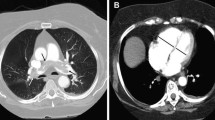Summary
Echocardiography can be used as a differential diagnostic procedure in the diagnostic workup of patients with clinically suspected pulmonary embolism. If RV pressure overload is ruled out in those patients, mortality from thrombembolism seems to be low irrespective of whether pulmonary embolism is present or absent. If, on the other hand, RV pressure overload is present, the prognosis is worse and is dependent on the presence of arterial hypotension at presentation and a patent foramen ovale. Clinicians no longer insist on definite confirmation of pulmonary embolism by nuclear imaging studies or pulmonary angiography especially if the patient is clinically unstable at presentation. It is, thus, evident that echocardiography has gained an important diagnostic position for the management of patients with suspected pulmonary embolism.
Similar content being viewed by others
Author information
Authors and Affiliations
Rights and permissions
About this article
Cite this article
Kasper, W., Konstantinides, S. & Geibel, A. The value of echocardiography in the diagnostic work-up of patients with suspected acute pulmonary embolism. Intensivmed 37 (Suppl 1), S051–S054 (2000). https://doi.org/10.1007/s003900070007
Issue Date:
DOI: https://doi.org/10.1007/s003900070007




